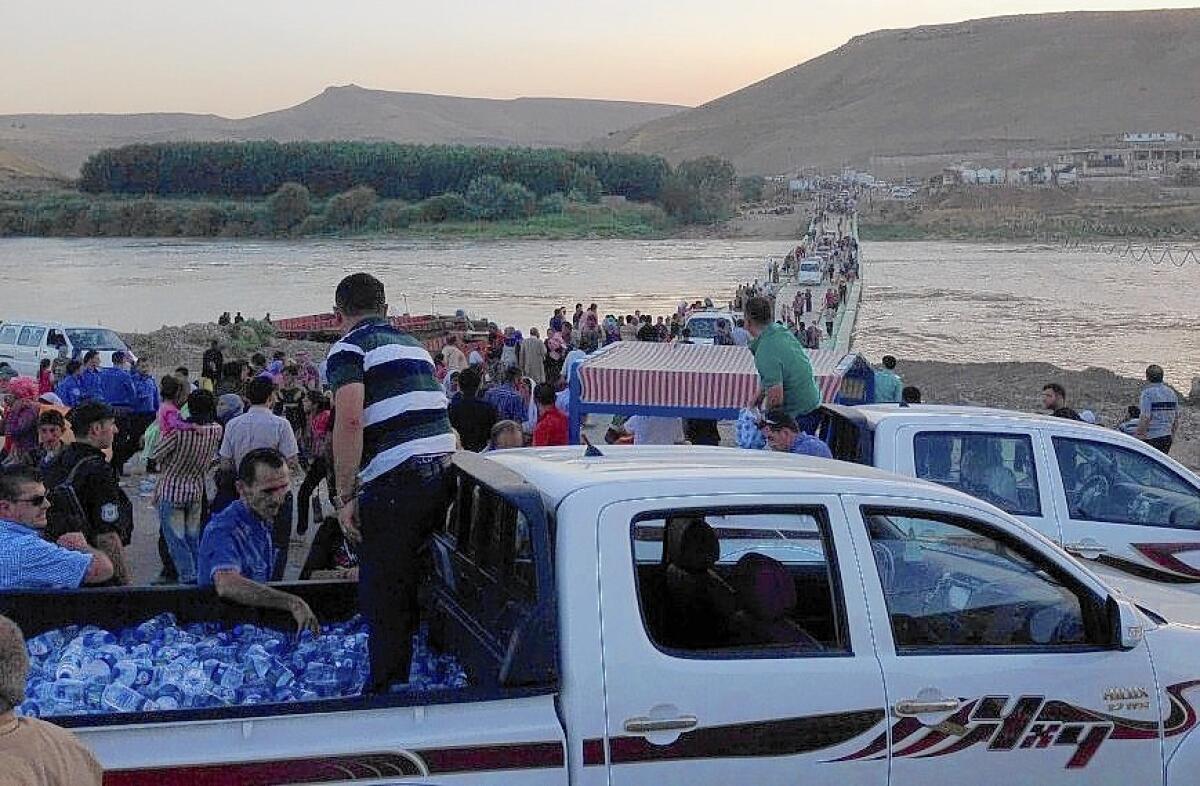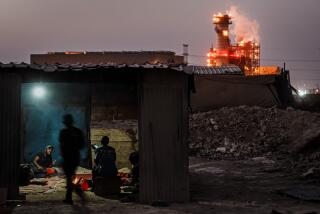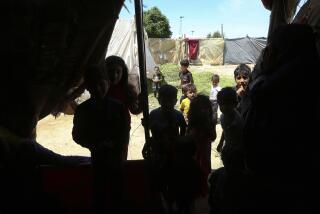Iraqi Yazidis describe flight from Islamic State militants

Reporting from Faysh Khabur, Iraq â The Murad family, caked in dust and grime, trudged through a dismal gravel quarry where mangy dogs dodged bulldozers as dusk approached along the banks of the Tigris River.
The Murads were among thousands of displaced Iraqis, members of the minority Yazidi sect, who crossed a shaky pontoon bridge Saturday back into Iraq from Syria after a six-day odyssey through mountain and desert, assisted by Kurdish fighters.
âI wanted to get my daughters out safely,â explained Burjun Murad, 45, a dignified, straight-backed figure with a thick mustache and a scarf wrapped around his head. âBut we want to go home.â
Accompanying him were his three daughters and his 80-year-old mother, all exhausted but relieved to be back in their homeland, though the Murads and other Yazidis face an uncertain future. Still, they were shielded for the moment from Sunni Islamist militants who had targeted them for execution and have allegedly been abducting Yazidi women.
As the Murads sought to rendezvous with family members at the quarry, Kurdish police and soldiers attempted to keep order amid a growing traffic jam and celebratory moment at the tiny, informal border crossing. In an incongruous scene, tired Yazidi families who barely have had enough to eat in recent days were suddenly loaded down with cases of water, packages of biscuits and red-and-white boxes of a Norwegian product that was labeled in English as âcompact emergency food.â
Those here had been among the tens of thousands of Iraqi Yazidis who had taken shelter on top of sprawling Mt. Sinjar for days after militants overran the northwest Iraq city of Sinjar, the heart of the Yazidisâ insular community. Many are now returning to Iraq via a roundabout route through neighboring Syria. Kurdish fighters in both Syria and Iraq are helping open the getaway path for Yazidis trapped on the barren peak.
Tens of thousands more are believed to remain on the mountain, many too feeble to move on or fearful of the Sunni militants below. Others are still in the Kurdish zone of Syria after leaving the mountain. An unknown number have been killed or are missing, community members say.
The possibility that the Yazidi people of Iraq face genocide was cited by President Obama on Thursday when he authorized airstrikes against the Islamist militants in Iraq and airdrops of humanitarian supplies for the besieged civilians.
It was a disquieting moment in the global spotlight for a long-marginalized, largely impoverished, ethno-religious group little known outside Iraq and Syria, and widely misunderstood even in their home nations.
They faced extermination at the hands of the militants of the so-called Islamic State, an Al Qaeda breakaway faction that has seized vast stretches of territory in northern and central Iraq and neighboring Syria.
Islamic State views the Yazidis â followers of an ancient faith linked to Zoroastrianism â as devil worshipers, a perception that Yazidis call a monstrous distortion of their beliefs. A central figure in the Yazidi faith, known as the Peacock Angel, is viewed by some Muslims as the equivalent of Satan.
Adding to the Yazidisâ sense of desperation has been a rumor that the militants were abducting Yazidi women in a tactic reminiscent of that used by Boko Haram, the extremist Islamist movement in Nigeria.
Dozens of displaced Yazidis interviewed here and elsewhere in northern Iraq said they believed that the militants have been abducting Yazidi women. One man who spoke at a nearby refugee camp said a female cousin had used a concealed cellphone to call him from a jail in Islamic State territory where 30 women were being held captive and faced sexual abuse. There was no independent corroboration of the allegation, but such reports have resonated in the Yazidi community.
âWe all heard what the women faced if they didnât agree to convert to Islam,â said Murad, after he and his family had crossed back into Iraq.
Along the Tigris, hundreds of Yazidi families rested Saturday. They ranged in age from infants to octogenarians, all traveling in extended families. Many had blisters and bloody sores on their feet after trekking through the mountain terrain in sandals or, in some cases, their bare feet. All said they fled the Sinjar area quickly last week once word spread that the militants were about to take the town.
âWe left everything behind â our homes, our savings, our clothing,â said a man who gave his name as Shamo, 30, seated near the river with a dozen family members, including his four young children. âWe are alive, but we have nothing left.â
The mountain provided a measure of security, they said, as the Islamic State fighters did not pursue them in the rough terrain. But there was little food or water and no protection from the elements. After a few days, they said, word spread that Kurdish fighters had opened a safe path to Syria, but they had to walk. From the Syrian side, they were taken in pickup trucks and other vehicles to the crossing point on the Tigris that led back to Iraq.
Many Iraqi Kurds, who are mostly Sunni Muslims themselves, came to greet them and express solidarity with the returning Yazidis, who are also Kurdish speakers. Volunteers tossed bottles of water and food from pickup trucks.
Officials and community leaders were arranging transportation to shelters, camps and other temporary lodging. Many of the displaced were being sent to Yazidi villages elsewhere in northern Iraq, where white temples with conical roofs glisten in the sun. At one such shelter, in the town of Sharia, about 40 miles to the south, scores of families who had escaped from the mountain were staying in several schools.
âWe all want to go home, but who knows when we can,â said Hannah Haji, 25, as her 2-year-old daughter clung to her legs.
Haji, who was pregnant, said the time on the mountain had cost the life of a baby. âThe doctors say the baby is dead inside me,â she explained without emotion outside one of the classrooms that has been converted to living quarters.
Many Yazidis are calling on the international community to assist them.
âWe donât have guns, but weâre willing to fight if someone helps us get our homes back,â said Moussa Berri Sino, 41, speaking at a camp for the displaced, now filled with Yazidis who have fled the Sinjar region. âAmerica or Europe or someone should help us.â
Others, though, were skeptical that such aid would come.
âWhat Obama did is too little, too late,â said Khidher Domle, who was helping to arrange aid for the displaced in Sharia. âIf the world truly was concerned, they would have acted a lot sooner.â
More to Read
Sign up for Essential California
The most important California stories and recommendations in your inbox every morning.
You may occasionally receive promotional content from the Los Angeles Times.










